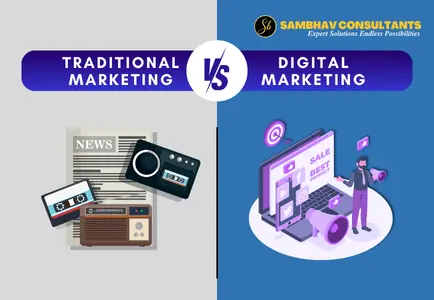

Although traditional marketing and digital marketing are two distinct approaches to marketing, they share a similar goal: reaching the targeted audience and promoting products and services. Digital marketing, in contrast to traditional marketing, makes use of Internet platforms and technologies to advertise products and services. Traditional marketing employs offline media to do this.
Conventional marketing is a type of advertising that reaches the target market using offline media and conventional techniques. It makes use of offline media including billboards, radio, television, direct mail, and telemarketing. With little to no chance of engagement, firms can broadcast their message to a bigger audience with this one-way marketing method. Typically, these promotional items are placed in areas where their intended audience is most likely to see, hear, or interact with them.
Digital marketing is a type of advertising that targets consumers by using digital technologies and internet platforms. The organization uses email, smartphone apps, search engines, social media, and other digital platforms for this. It is a two-way marketing communication strategy that enables proper interaction, engagement, and the exchange of feedback and/or ideas between the organization and the target audience. With the use of digital marketing, an organization may target a particular audience, track the effectiveness of their campaigns, and optimize their strategy.
Promotional Medium - Conventional Marketing uses several traditional platforms like radio, television, newspapers, magazines, billboards, direct mail, and flyers for promotion. Digital marketing, on the other hand, makes use of digital platforms and technology, such as email, search engines, social media, websites, online advertisements, and mobile apps.
Targeting and Reach - Conventional marketing generally has a less focused targeting and a wider audience. In other words, a large audience gets exposed to advertisements including people who might not be interested in the good or service. Digital marketing allows businesses to reach particular demographics, interests, habits, and places with its highly focused marketing. This is because you're addressing a more relevant audience, and this could result in a higher return on investment (ROI).
Price and Return on Investment - Digital marketing is usually less expensive, and analytics tools allow for more precise tracking of return on investment. Campaign performance and efficiency can be increased by advertisers by optimizing them in real-time. Conventional marketing, however, may be more expensive, particularly when it comes to advertising in print magazines or on popular media like television.
Communication and Engagement - Conventional marketing offers little opportunity to connect to the audience. The message is delivered to the audience in a one-way fashion without any direct contact or scope of interaction. Real-time audience connection, engagement, and feedback are made possible by digital marketing through reviews, comments, messaging, and other interactive features.
Adaptability and Flexibility - Conventional marketing necessitates a large amount of preparation and execution time. Campaign alterations and revisions can be costly and time-consuming as well. Digital marketing provides adaptability and quickness. Campaigns can be swiftly modified in response to real-time information and insights. Optimization and A/B testing are standard procedures.
Analytics and Measurability - As far as Conventional Marketing is concerned, determining a campaign's performance can be difficult because there isn't enough information accessible to properly assess its efficacy. Digital marketing, however, offers thorough analytics and data that let companies monitor the effectiveness of their initiatives in great detail. It is possible to evaluate and analyze metrics like impressions, clicks, conversions, and consumer behavior.
Local versus Global Reach - Conventional Marketing can focus on a local or regional market, making it appropriate for companies that want to operate in a certain area. Digital marketing provides a worldwide reach, enabling companies to target customers both domestically and abroad.
It is undeniable that traditional advertising still has a significant role in some targeted markets and industries. Even though digital marketing is becoming more and more popular, traditional media can still be utilized to enhance digital strategies and target people who are difficult to reach online. Digital marketing, on the other hand, provides measures used to gauge the performance of digital marketing like conversion rates, website traffic, click-through rates, return on investment, and engagement metrics. So now that you know all about these two forms of marketing, find out what’s best for you and set sail TODAY!